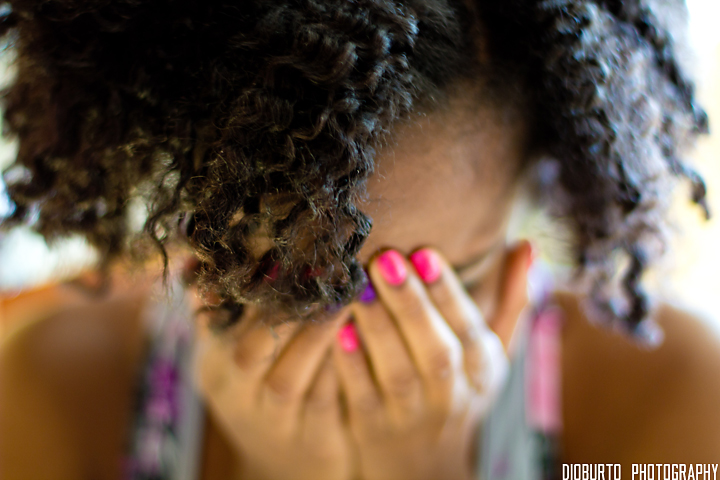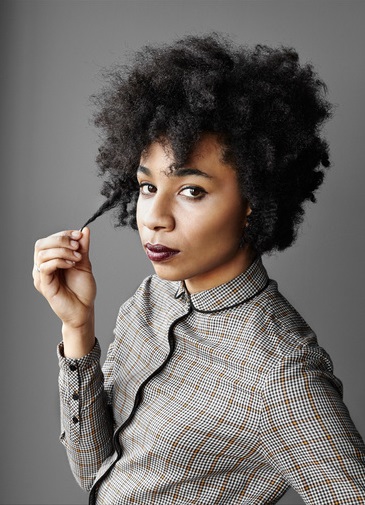
A few weeks ago, I stepped away from the kinky/curly hair community for a basic haircut. I’d re-entered the space with an understanding of how I revel in the fragmentation of the African-American community. While I question what it means to be united with other African-Americans, I used my hair to play up my self-worth. This revelation was manifested by a simple trip to the hair salon.
At the beginning of this journey, I first consulted members of my collective via YouTube. I, after much deliberation, headed to a salon in SoHo, NY. I entered the salon and immediately noticed two black women, both of which had loose, well-defined curls. I signed-in and traded my jacket for a silk robe. Once I took a seat in the lobby there were a couple of women, neither of which were black, sitting in the same area. I couldn’t help but notice their hair, as mine was tightly coiled and kinky, but theirs were loose and free flowing. After some time a beautician, who also wasn’t black, escorted me back to the station where my hair would be cut.
I sat in the chair, looked at my hair in the mirror, then looked up at her. The black women I’d noticed when I first walked in had walked by and I felt them judging me as they cut looks at me from the corners of their eyes. Instead of their perceived disdain, I wished they’d have come over and held my hands during the process or one of them had cut my hair themselves. All I could do is pray silently to myself that the non-black woman in charge of my appearance would be enlightened with an understanding of all the complications and nuances of my hair. Neither of us said a word as she pulled and cut it.
I became acutely aware of my need to feel a part of a group while in high school.
I hadn’t expected her to speak at all, so the “hi” she greeted me with caught me off guard. When she was roughly thirty percent done, she asked, “what did you put in your hair?!” My response? “Light oil.” An awkward silence fell on us when she said “next time don’t come with anything in your hair.” Her face looked as serious as a professor on exam day. She silently shook her head and I noticed my hands were sweating up a storm. Truthfully, I was nervous and had a strong urge to shout “help!” to the only other black women in the salon. The fact they had a much different hair texture than mine was something I cared nothing about. They were black and this was a black girl hair emergency.
The entire scene, had anybody knew what I was mentally going through, would’ve made an interesting juxtaposition. On one hand there was me, sitting in a salon chair and feeling as if I’d made a grave mistake. On other the side, black and white women alike were under dryers, sitting at hair cutting stations looking to be having an enjoyable experience. I became increasingly self-conscious and obsessed with all the ways my curls were different than the women around me. It terrified me to share this space with them.
After what seemed like an eternity, she finally broke the silence. “Don’t worry, I’m not mean,” she said. “I’m just super serious while I’m cutting hair.” I was overcome with relief. When the cut was over, she took me back to the shampoo area. At last, refuge. At this station there was a girl with hair similar to mine, one who spoke in the natural hair lingo that comes with our “wash day” woes and twist out battles, to rescue me. We had a much needed moment that certainly would’ve benefitted me about fifteen minutes prior.
To blend in, I tried code-switching but that was a fail. Though kids in this program came from all different backgrounds, my blackness was made to feel insufficient.
What occurred to me during this trip was how I would feel describing the intricacies of my hair to the woman who was cutting it. Spelling out the rules of the natural hair community to someone who is clearly not of it would mean me revealing to her the minute ways in which we as African Americans fragment ourselves based on hair texture. It felt wrong to expose my problematic truths to this woman, who was so far removed from it all. I wanted her to see the power and strength of my hair. I didn’t want her to know my weak point or be clued into the fact I was still figuring out what it meant to truly be a part of the black community.
I became acutely aware of my need to feel a part of a group while in high school. My parents, during my sophomore and junior year of high school, enrolled me in a series of D.C. programs, one of which was the Mayor’s Youth Leadership Institute (MYLI). MYLI is a summer youth employment program which brings kids together from various sections of the city. While participating in MYLI, I experienced the very first questions about my blackness because of my light skin, having grown up in a two-parent household, my homeschool education, and my relaxed straight hair.
To blend in, I tried code-switching but that was a fail. Though kids in this program came from all different backgrounds, my blackness was made to feel insufficient. My truths were used as tools to dismantle my place within the African American community. The fostering of love within the context of my black family, made available to me at home, seemed to be non-transferable once my parents put me in this program. Finding my place became the fixation of my perceived struggle. Since I couldn’t change my background, parental situation or my skin color, my hair became the vehicle in which I’d compensate for my perceived lack of “blackness.”
Once I got to college, I felt like finding my place was damn near an insurmountable obstacle. Everything about the African American community seemed further fragmented based on where you grew up, if you pledged, if you played a sport, etc. Even with all these different options to choose from, I still felt misplaced. I made my way into the natural hair community during my sophomore year in college around the same time everyone was doing the “big chop.” This also coincided with a swing of suiting up in 90’s nostalgia. I hopped on both bandwagons and returned to DC that summer a much different version of myself.
While I may feel validated by the fact that I no longer need to answer the question, “are you black?,” I no longer feel my blackness is to be packaged and sold as an aesthetic that I use to help me fit in with other black people.
Everyone, who had made the journey back to natural seemed to have this glow about them, however, the true allure for me was pledging allegiance to this sort of stranded sisterhood and speaking a language. It was a language that sounded like love and looked like reminders of radical self-care. This was tantalizing to a girl who felt lost and powerless among her people.
This piece of the African American tribe seemed indestructible. It looked as though no one could end our journey or disrupt us while we relearned our natural hair together. It took a minute to find the courage to cut my hair but losing those relaxed ends gave me so much more. And I was all about protecting my own “sacred” natural hair experience within the confines of this faction at all costs. For me, losing those relaxed strands meant the search for my “place,” was over.
Having my hair touched by the wavy-haired white woman made me aware I wasn’t ready to share my natural hair journey with anyone else who wasn’t a part of that experience. I’m only ready to share it with those who have a walk and talk similar to mine.
While I may feel validated by the fact that I no longer need to answer the question, “are you black?,” I no longer feel my blackness is to be packaged and sold as an aesthetic that I use to help me fit in with other black people. It’s much deeper than that. It’s about loving my blackness and yours while using this as the forum through which we can build community. This is the real struggle I should be fixated on, not selfishly further fragmenting the African American community based on hair texture.
